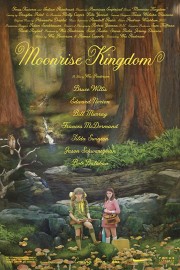Moonrise Kingdom
Wes Anderson left me kind of speechless after watching “Moonrise Kingdom.” I still feel like his 2007 film, “The Darjeeling Limited,” remains his most deepest film on an emotional level, but his newest film makes a damn-good case for supplanting it.
In many ways, “Moonrise Kingdom,” with a heartfelt and hilarious screenplay by Anderson and Roman Coppola (who also co-wrote “Darjeeling Limited”) feels like a perfect follow-up to Anderson’s previous effort, the stop-motion film, “Fantastic Mr. Fox.” In fact, I’d go as far as to say that it is, like that film, a perfect movie for children, despite its PG-13 rating. Yes, there are some suggestive moments that parents might balk at, but I’d be much more comfortable showing my children this movie over a lot of “family films.” A big part of that is because it treats its main characters, who are on the cusp of being teenagers, intelligently and respectfully. Their feelings, their pains, and their desires are treated in an honest and beautifully funny way.
The film’s focus is on Sam Shakusky (Jared Gilman), a peculiar young boy who has run away from his Khaki Scouts troop to be with Suzy Bishop (Kara Hayward), the daughter of a pair of lawyers (Bill Murray and Frances McDormond) who is every bit as odd as Sam. Of course, by 1965 standards (the year the film is set), they are damaged goods, but really, they are like any other child whose life has been fractured by family pain– Sam is an orphan, while Suzy understands, acutely, the forces that have torn her family apart emotionally. Suzy always has a pair of binoculars with her, observing the world around her with fierce intelligence, seeing things that others don’t. Through flashback, we see their odd pairing begin, and we watch as they travel through the nature of the island they live on, all the while the grown-ups– Suzy’s parents, Captain Sharp (the police chief played by a very not macho Bruce Willis), and Scoutmaster Ward (Edward Norton, who hasn’t been this good on-screen in years) –try to sort out what Sam and Suzy are doing, and why they’re doing it.
I think that’s all I’m going to give away of the story, mainly because, like Wes Anderson’s previous films (“Bottle Rocket,” “Rushmore,” “The Royal Tennenbaums,” “The Life Acquatic With Steve Zissou,” “The Darjeeling Limited,” and “Fantastic Mr. Fox”), the best part about “Moonrise Kingdom” is how events unfold in sublimely entertaining, and ridiculously surprising, ways. Anderson’s idiosyncratic visual and verbal style may be a frequent signature throughout all of his movies, but Anderson doesn’t just make “quirky comedies”; whether it’s in his early collaborations with Owen Wilson or his recent work with other writers (be it Coppola, Jason Schwartzman, or Noah Baumbach), Anderson also finds a way to dig deep into the recesses of feeling in his characters, who feel more real, more down-to-Earth, than the beings we get in the most asinine Hollywood comedies, whether it’s “That’s My Boy” or “What to Expect When You’re Expecting.” Having said that, I suppose I SHOULDN’T be surprised at just how much I loved “Moonrise Kingdom,” especially as a fan of even Anderson’s most flawed films, but as with “Darjeeling Limited,” it feels like there’s more at work in this film.
I think it’s the profound link to childhood, in all its sense of discovery and seeming “certainty,” that really struck a chord with me about “Moonrise Kingdom.” (Of course, part of it is the absurd exaggerations Anderson colors his “Khaki Scouts” with, taking me back to my days as a Boy Scouts, but that adds more to the comedic palette than the emotional one.) It’s true that Sam and Suzy, played by newcomers Gilman and Hayward with remarkable confidence and a natural connection to one another, are not your average children, but the experiences they go through during the course of their journey (however exaggerated) feel very real to me, and reminded me of my own attempts at self-discovery when I was younger. True, I didn’t draw, with a fondness for nudes and landscapes, like Sam does, and while I performed in several plays over the years, I was never recast because I was difficult, as Suzy was during a church production of Noah’s Ark, but I felt a real kinship with Sam and Suzy, and even wish I had known someone like Suzy, who has a very matter-of-fact way about her that’s pretty appealing, when I was a kid on the cusp of teenagehood. Maybe those years of middle and high school would have been more adventurous. Maybe not, but I have to say, I’m grateful we have filmmakers like Anderson around who can tap into those feelings, and explore them in an original, and lively way. My childhood may be gone forever, but through films like “Moonrise Kingdom,” I’m glad I can look back, and feel some of what I felt back then again.










